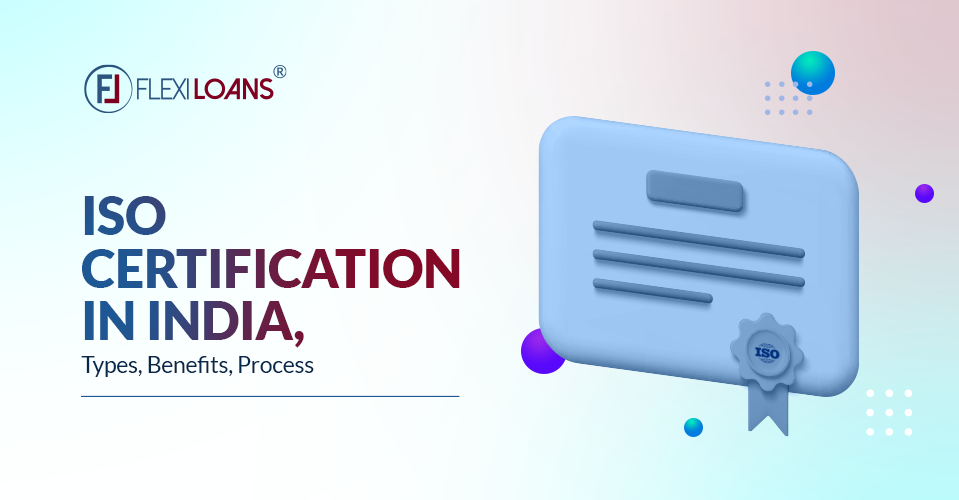Nov 27, 2022
Dec 16, 2025

The ISO creates international business standards. There are various benefits for businesses that adhere to ISO standards. Achieving ISO Certification for a company is a significant accomplishment because ISO is an independent body. ISO certification in India improves a company’s efficiency and effectiveness. If you want your business to be solid, profitable, and have a strong brand image, you need to know the entire process of ISO certification registration in India.
What exactly is an ISO certificate registration?
ISO certificate registration gives companies standards and promotes trade and innovation. It is necessary to obtain ISO certification to set quality, safety, and efficiency standards for products and services. It also ensures products and services meet consumer and regulatory requirements. It certifies that the company’s management system meets ISO standards, benefiting the business, customers, and employees.
ISO certification also helps to demonstrate a commitment to continuous improvement. It certifies that the next process meets standardisation and quality checks.
How can you apply online in India for ISO certification?
You can apply for ISO certification in India online. Certification requires broadband Internet, video conferencing, and computers. You can apply for ISO registration online by filling out the online application form. You’ll get audit date instructions via email after filling out the form.
Auditors conduct audits via remote conferencing and document exchange. They organise a video tour to observe facilities, activities, and resources. The certification process takes 15 to 30 days.
How to get ISO certification in India?
ISO certification in India requires checks and tests at your organisation’s premises, so you must arrange for an audit.
ISO certification in India has grown popular since many multinational organisations outsource to India and implement Indian-based quality management systems.
ISO certification process in India generally involves the following steps:
Finding a reputable certification body
There are several methods and certification bodies, and costs vary. Some claim to be easier but are unreliable. Checking the certification’s accreditation, timeline, and website for updates is essential.
System and documentation establishment
It is a crucial ISO Certification step. You can hire ISO-experienced staff to develop the document, train staff, and maintain records. You may also hire an external resource to speed up the procedure.
Documents for ISO registration are
- Company Letterhead
- Company visiting card
- Company pan card
- Company address proof
- Sales & purchase bill copy
- Company profile
Complete the application and get a quote
Request a quote or contract by filling out the application form and finalizing the payment.
Stage 1 audit
The audit team will set a date for stage 1, which checks audit preparedness.
Stage 2 audit
The audit team will do a second audit. Officials will inspect procedures, equipment, system records, and facilities. They look for areas for improvement and non-conformities. They issue ISO certification after successful completion.
Also Read About: How to get Business Loan in easiest Way
What are the benefits of ISO certification
Global Recognition
ISO is a quality-focused international organisation. It will give recognition to your business worldwide if you get ISO certification. If your business gets ISO certification, it will get global recognition.
Better Business options
Achieving ISO certification will improve your product’s efficiency and quality. Customer satisfaction will rise, and product prices will decrease. These will help expand sales in emerging markets across the nation.
Quality and performance consistency
You will be aware of the requirements for finalising business procedures. Regular processes help avoid duplicates, identify the issues, and provide quick, efficient solutions.
Satisfaction of customers
ISO standards improve your company’s processes and quality. It will enhance customer satisfaction and put you in a better position to compete with your competitors in the marketplace.
What is the cost for ISO registration in India?
The ISO registration fees vary depending on the company’s employee number and other factors, such as the procedures and processes to run the business.
What are the types of ISO certificates?
ISO 9001
It’s a method for establishing, executing, and maintaining a company’s Quality Management Program. Any business capital and size can use it.
OHSAS 18001
The standard specifies health and safety management program requirements. It includes practices, plans, documents, safety and health procedures, and policies. All organisations continue to adhere to the standards set in 2007.
ISO 45001
The standard outlines occupational health and safety system requirements. It includes Risk Assessment, guidelines, procedures, operations, programs, Hazards Identification, and records. Various industries are implementing the standard.
ISO 27001
It is a standard for information security and a method for bringing information security under management control.
ISO 22000
This ISO standard defines food safety management guidelines (FSMS). It enables any organization involved in the supply chain to run, maintain, improve, develop, and implement an FSMS that provides safe items and products.
ISO 50001
ISO 50001 improves energy efficiency in organizations. This ISO certification manages documentation and reporting of energy use and consumption. It also covers procurement and design guidelines for energy-using equipment and other aspects the company can track and control.
ISO 20000
This standard ensures an organization’s efficient IT Service Management. It’s vital for IT-reliant industries. It impacts your business and how you communicate. It is a crucial element of how you conduct business.
ISO 31000
A risk management program gives information on the basics and processes for ensuring safety and managing risks according to an internationally accepted benchmark. The ISO 31000 standard ensures company success. It helps organizations evaluate threats, accomplish goals and opportunities, and treat risk.
ISO 14001
It is manual for setting up an environmental management system. It covers company policies, environmental processes, procedures, strategies, and records. ISO 14001 provides a structure and policies for an EMS. The world adopted this standard set in 2015.
Also Read About: What is Business Financing
Conclusion:
ISO certification is a powerful tool that can transform your business, enhance your business credibility and open doors to global opportunities. There are multiple types of ISO Registration options pertaining to different industry standards. You must complete the ISO certification process if you are looking to raise the caliber of goods and services of your organisation and tap into a larger market.
Businesses can show their dedication to upholding global standards for efficiency, safety and quality by acquiring ISO certification. The registration procedure ensures that your organisation is in line with internationally accepted best practices through audits, documentation checks and ongoing improvement initiatives.
In addition to improving operational effectiveness, ISO registration substantially boosts an organisation’s business loan eligibility, which facilitates in the acquisition of tailored business loans. ISO-certified companies are preferred by lenders as they demonstrate commitment to risk mitigation, quality control and adherence to global standards. This boosts their eligibility for business loans further and ensures faster approvals, fostering confidence in the lending institutions.
FAQs
ISO certification is the process through which a business or organization becomes certified to international standards set by the International Organisation for Standardisation (ISO). This registration demonstrates adherence to the best industry practices and quality management standards.
The duration of the ISO certification process varies depending on the size and complexity of your organization, as well as your current level of compliance with the chosen standard. On average, the process can take anywhere from 6 to 12 months.
While it is not mandatory, having an ISO certification enhances your brand image and increases preference among customers, industries, and regulatory bodies. It showcases your organization’s commitment to adhering to international standards.
The cost of ISO certification ranges between ₹3,000 and ₹4,000, depending on factors like the size of your organization, the complexity of your processes, and the specific standard you are pursuing. It may also include an additional processing fee.
The process begins by selecting the ISO standard relevant to your industry (like ISO 9001 for quality management). You must document your processes, implement changes to meet the standards and undergo an audit by a certified registrar.
ISO certification boosts credibility, making it easier for businesses to secure the desired line of credit. It demonstrates a commitment to quality, reducing lender risks. Additionally, it enhances reputation and operational efficiency, increasing the chances of quick loan approvals.
ISO certificates are typically valid for 3 years. During this period, your organization will undergo surveillance audits to ensure ongoing compliance with the standard. After 3 years, you must undergo a re-certification audit to renew your certification.
Improved Quality: Ensures better products and services
Increased Trustworthiness: Boosts reputation and trust with customers
Access to New Markets: Opens doors to more business opportunities
Customer Satisfaction: Leads to higher customer loyalty
Operational Efficiency: Streamlines processes and reduces costs
Risk Management: Helps identify and mitigate business risks
Regulatory Compliance: Eases global trade by meeting international standards
-ISO 9001 for Quality Management
-ISO 14001 for Environmental Management
-ISO 27001 for Information Security Management
FlexiLoans is your trusted partner for working capital loans, catering especially to the MSMEs by providing flexible, affordable and unsecured business loan solutions with quick disbursal. This helps businesses grow and thrive in competitive markets.







